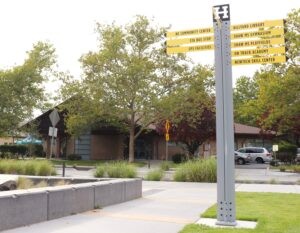A need fulfilled: MultiCare partners with NECC to open much-needed behavioral health clinic in Spokane

At a glance
- MultiCare Behavioral Health Northeast Spokane opened in November to serve Hillyard residents
- Improving neighborhood access was key in choosing location at Northeast Community Center
- Providers, therapists, peer counselors and virtual options are available for all age groups
In Northeast Spokane sits a hub for community resources. The Northeast Community Center (NECC) provides access to child care, a senior center, financial and employment assistance, food security, doctors, dentists, a pharmacy and many other services.
MultiCare partnered with NECC to add yet another critical resource: MultiCare Behavioral Health Northeast Spokane. The clinic opened Oct. 4.
Taking over the renovated Hillyard library — which opened a new location across the street — the clinic is in a prime location to serve not only users of NECC, but also Shaw Middle School students across the street and families who travel through the neighborhood daily.
“The local Hillyard neighborhood doesn’t have a lot of access points for behavioral health,” says Samantha Clark, MHA, assistant vice president for strategy and business development, MultiCare Behavioral Health. “This is exciting to get them something that is a one-stop shop at NECC … and for many people, on the bus line they already take.”
Health care often demands patients come to providers, Clark says, but transportation can be a significant barrier to receiving care. With this new clinic, they’re meeting patients where they are.
Once fully staffed, the clinic will employ more than 20 outpatient behavioral health providers, therapists and peer counselors to serve all age groups. They will share 21 office spaces; six virtual hubs for telehealth appointments; three group rooms for family, group or play sessions; and a 40-person room for group training and events.
Over time, Clark hopes to add medication management, substance use programming and walk-in availability. It will take a few months to ramp up, but given current wait times locally, she anticipates clinician and provider calendars will fill up quickly.
A need fulfilled
Access to mental health support is a top priority for local families, according to a 2019 community survey conducted by The ZONE at NECC, a resident-led initiative to bring programs and resources to Northeast Spokane.
“Much of our work since then has focused on supporting mental health, social-emotional growth, peer groups and connection to community resources to try alleviating some behavioral health anxiety that existed — without being professional practitioners,” says Jene Ray, The ZONE director and NECC associate director. “We were doing what we could … but there was a lack of access, and then with COVID, suddenly everything closed.”
When the library relocated, Ray says NECC jumped at the opportunity to partner with MultiCare to establish MultiCare Behavioral Health Northeast Spokane.
“A kid being able to get excused and walk to therapy is incredible. This is giving us an incredible opportunity to see what accessible mental health care does for the mental health of kids.” — Samantha Clark
Several improvements were made to the site and surrounding area through a collaboration with other stakeholders, including the city of Spokane and Spokane County, the Washington State Department of Commerce, the MultiCare Inland Northwest Foundation and Ballmer Group.
The library was an ideal space to repurpose in such a way, says Tim Thomas, president of Bouten Construction. The building’s vaulted skylights will provide an abundance of natural light to the clinic and patient rooms.
Bouten, which has been around since 1944, is committed to building places that matter in their home community, Thomas says. A clinic in this challenged neighborhood, directly across from a school so kids can have better access, is a perfect example of that mission.
“I think everybody and every family is touched by mental health challenges,” Thomas says. “I’m very happy to see that Spokane is stepping up in a more accessible fashion to address that.”
Increasing youth access
Students who seek mental health support outside of school typically can’t go during the day, or they don’t have transportation before or after school because of their bus route or parents’ work schedules. And Shaw Middle School counselors have caseloads of 300 or more.
Funding from the city of Spokane covered road quieting work on the street between the clinic and Shaw Middle School, which will make it safer and easier for students to cross the street to attend appointments, Ray says.
“A kid being able to get excused and walk to therapy is incredible,” Clark says. “This is giving us an incredible opportunity to see what accessible mental health care does for the mental health of kids.” 
While the clinic will have a heavy focus on child and family services, Ray says many other groups will also benefit from improved access, including their large immigrant and refugee population, the vibrant senior center and families of their 306 Head Start preschoolers.
Forging new paths forward
Northeast Spokane has double the rate of family violence compared to the rest of Spokane, Ray explains. Families also face extreme economic hardship, with more than half of households falling 185 percent below the federal poverty line.
“That generational poverty causes a lot of the behaviors we see in children,” she says. “[This clinic] allows them to be a part of something bigger and see the hope.”
More than anything, Clark hopes residents sees this as their clinic.
Toward that effort, MultiCare is collaborating with local universities and community colleges to establish peer counselor training programs. Improving health equity involves providing career opportunities for residents to stay in their community and care for their neighbors, Ray adds.
“I know that in 10 years we’re going to have so many pathways to enter the behavioral health field,” she says. “We’re going to expose people to this career pathway and we’re going to build a diverse body of practitioners to serve this community.”




